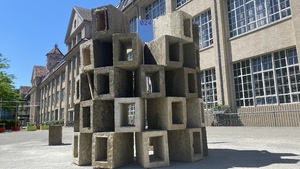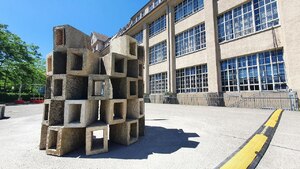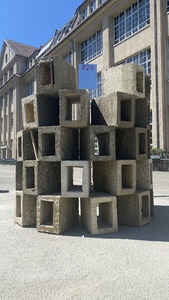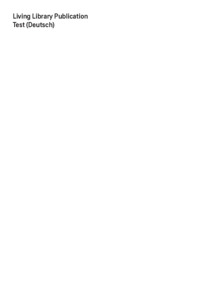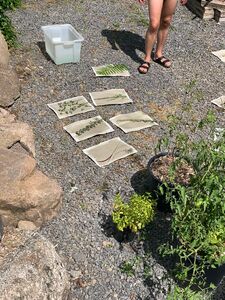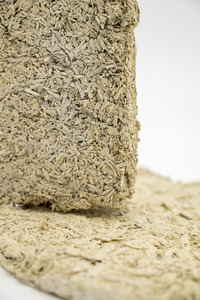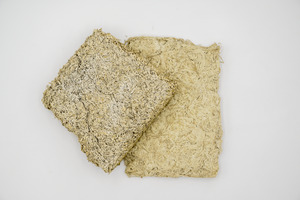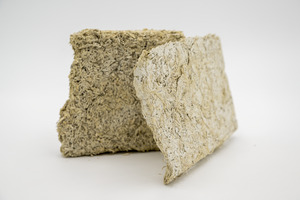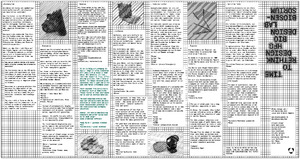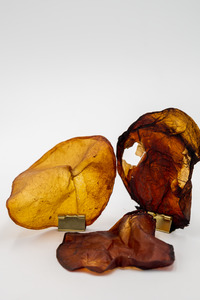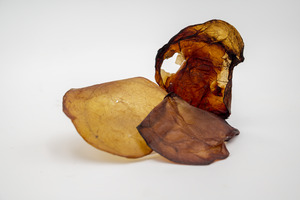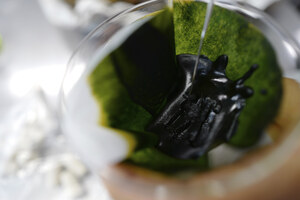Bio Design Lab
| Name | Bio Design Lab |
88 Inhalte
- Seite 1 von 8
Biosensorium - Living Pavillion
- Titel
- Biosensorium - Living Pavillion
- Titel (en)
- Biosensorium
- Beschreibung (de)
- Fotografien der während des Seminar „Biosensorium“ entstandenen Material-Samples.
- Beschreibung (en)
- Photographs of the material samples created during the "Biosensorium" seminar.
- Typ des Projekts/Werks
- Schlagworte
- Datierung
- Sommersemester 2021
- Mitwirkende
- Material
- Ort: Institution
- Ort
- Biosensorium
- Stadt
- Land
- Beteiligte Institution(en)
- Titel
- Biosensorium - Living Pavillion
- Urheberrechtshinweis
- Bio Design Lab
- Rechtsschutz/Lizenz
- Medienersteller/in
- Projektleiter/in
- Semester
- Lehrveranstaltung
- Importiert am
- 26.10.2023
- Übergeordnete Sets
- 1
Biosensorium - Living Pavillion
- Titel
- Biosensorium - Living Pavillion
- Titel (en)
- Biosensorium
- Beschreibung (de)
- Fotografien der während des Seminar „Biosensorium“ entstandenen Material-Samples.
- Beschreibung (en)
- Photographs of the material samples created during the "Biosensorium" seminar.
- Typ des Projekts/Werks
- Schlagworte
- Datierung
- Sommersemester 2021
- Mitwirkende
- Material
- Ort: Institution
- Ort
- Biosensorium
- Stadt
- Land
- Beteiligte Institution(en)
- Titel
- Biosensorium - Living Pavillion
- Urheberrechtshinweis
- Bio Design Lab
- Rechtsschutz/Lizenz
- Medienersteller/in
- Projektleiter/in
- Semester
- Lehrveranstaltung
- Importiert am
- 26.10.2023
- Übergeordnete Sets
- 1
Biosensorium - Living Pavillion
- Titel
- Biosensorium - Living Pavillion
- Titel (en)
- Biosensorium
- Beschreibung (de)
- Fotografien der während des Seminar „Biosensorium“ entstandenen Material-Samples.
- Beschreibung (en)
- Photographs of the material samples created during the "Biosensorium" seminar.
- Typ des Projekts/Werks
- Schlagworte
- Datierung
- Sommersemester 2021
- Mitwirkende
- Material
- Ort: Institution
- Ort
- Biosensorium
- Stadt
- Land
- Beteiligte Institution(en)
- Titel
- Biosensorium - Living Pavillion
- Urheberrechtshinweis
- Bio Design Lab
- Rechtsschutz/Lizenz
- Medienersteller/in
- Projektleiter/in
- Semester
- Lehrveranstaltung
- Importiert am
- 26.10.2023
- Übergeordnete Sets
- 1
Die Living Library
- Titel
- Die Living Library
- Mitwirkende
- Titel
- Die Living Library
- Urheberrechtshinweis
- (CC BY-NC 4.0) Karlsruhe University of Arts and Design and the authors
- Rechtsschutz/Lizenz
- Medienersteller/in
- Medien-Beschreibung
- The Living Library is a transdisciplinary project developed at the Bio Design Lab of the Karlsruhe University of Arts and Design. Over the course of two years, it fostered practice-based learning focused on locally sourced raw materials within a 50-kilometre radius around the academy, experimental making, and regenerative modes of production.
The project is a hybrid and continually evolving ecosystem. It brings together a physical archive showing material samples, tools, processes, and workshop artefacts, and a digital archive featuring interactive maps, research, and material documentation. Guided by the principles of compostability, locality, and sustainability, the project follows ecological rhythms of seeding, growing, harvesting, and decay. Students, researchers, and local practitioners collaborated to map regional resources, harvest and transform bio-based materials, and investigate their lifecycles from origin to decomposition.
This publication reflects the project’s circular approach. It documents the physical and digital Living Library and brings together a series of essays that explore themes such as the archival qualities of soil or the garden-like cultivation of digital platforms. These essays invite readers to reconsider how knowledge can be grown, shared, and ultimately returned to the ground from which it emerged.
- The Living Library is a transdisciplinary project developed at the Bio Design Lab of the Karlsruhe University of Arts and Design. Over the course of two years, it fostered practice-based learning focused on locally sourced raw materials within a 50-kilometre radius around the academy, experimental making, and regenerative modes of production.
- Importiert am
- 04.02.2026
- Übergeordnete Sets
- 0
Folkfarma
- Titel
- Folkfarma
- Titel (en)
- Folkfarma
- Beschreibung (de)
- Co-Healing und Health Commmons in der Bioregion Karlsruhe
Designforschungs-Workshop mit Serina Tarkhanian
Folkfarma ist ein einwöchiger Workshop, der darauf angelegt ist, neue Konzepte von Gesundheit und Wohlbefinden zu entwickeln und umzusetzen. Dabei werden Gesundheit und Wohlbefinden als restaurative und wechselseitige Beziehung zur Umgebung gedacht. Die Teilnehmenden werden eine kritische und regenerative Perspektive auf Materialien im Kontext von Gesundheit und Pharmakologie gewinnen und untersuchen, wie Fragen der Biopolitik und der Dekolonisierung von Fürsorge untrennbar mit lokalen Ökologien verbunden sind. Durch experimentelle Praktiken wie restaurative Nahrungssuche, DIY/DIT-Produktionstechniken, die in traditionellen Heilpraktiken verwendet werden, und durch die Erkundung ihrer eigenen körperlichen Beziehungen zur Umgebung werden die Teilnehmenden eingeladen, neue Wege des Folkfarming zu entwickeln, die auf Elemente der Bioregion Karlsruhe fokussieren.
In den Workshops werden die Teilnehmenden eingeladen, sich als aktive Co-Forschende zu verstehen und gemeinsam Visionen für Co-Healing und Health Commons zu entwickeln. Neben praktischen Aktivitäten, Kurzvorträgen und Besichtigungen vor Ort werden sich die Lehrmethoden auf das verkörperte Forschen und Lernen konzentrieren, das die Workshop-Leiterin im Sinne eines "embodied training" als Designforscherin selbst entwickelt hat. Die von den Teilnehmenden realisierten Arbeiten werden als integraler Bestandteil der eigenen Designforschung der Workshop-Leiterin in das Kapitel einer Folkfarmacopeia einfließen, welches die einzigartigen Visionen der Teilnehmenden rund um das Thema Co-Healing in ihren Bezügen zu Karlsruhe und der Bioregion zeigt.
- Co-Healing und Health Commmons in der Bioregion Karlsruhe
- Beschreibung (en)
- Co-Healing and Health Commons in the Karlsruhe Bioregion
Design Research Workshop with Serina Tarkhanian
Folkfarma is a weeklong workshop that seeks to imagine and materialize new definitions of what health and well-being might be when it is thought of as a restorative and mutually beneficial relationship to the land. Participants will gain a critical and regenerative perspective on material culture within the context of health and pharmacology, examining how issues surrounding the biopolitics and decoloniality of care are inextricably linked to local ecologies. Through experimental practices such as restorative foraging, DIY/DIT production techniques used in traditional healing practices, and by examining their own bodily relationships to the environment, participants will be invited to create new ways of folkfarming that focus on elements of the Karlsruhe bioregion.
In the workshop participants will be invited to position themselves as active co-researchers and to co-produce visions for co-healing and health commons. Alongside hands-on activities, short lectures, and site visits, instructional methodologies will focus on embodied researching and learning, referred to as ‘embodied trainings’, which stems from the facilitator’s own practice of making-with embodied knowledges. As an integral part of the facilitator’s own design research inquiry into the aforementioned themes, the work generated by participants will help form a chapter of a Folkfarmacopeia, showcasing participants’ unique visions around co-healing relationships to Karlsruhe and its environments.
- Co-Healing and Health Commons in the Karlsruhe Bioregion
- Typ des Projekts/Werks
- Schlagworte
- Datierung
- 06.09.2021 - 10.09.2021
- Mitwirkende
- Ort: Institution
- Ort
- Bio Design Lab & Bioregion Karlsruhe
- Stadt
- Land
- Titel
- Folkfarma
- Urheberrechtshinweis
- Serina Tarkhanian
- Rechtsschutz/Lizenz
- Medienersteller/in
- Projektleiter/in
- Semester
- Importiert am
- 30.10.2023
- Übergeordnete Sets
- 1
Hempcrete
- Titel
- Hempcrete
- Titel (en)
- Biosensorium
- Beschreibung (de)
- Fotografien der während des Seminar „Biosensorium“ entstandenen Material-Samples.
- Beschreibung (en)
- Photographs of the material samples created during the "Biosensorium" seminar.
- Typ des Projekts/Werks
- Schlagworte
- Datierung
- Sommersemester 2021
- Mitwirkende
- Ort: Institution
- Ort
- Biosensorium
- Stadt
- Land
- Beteiligte Institution(en)
- Titel
- Hempcrete
- Urheberrechtshinweis
- Bio Design Lab, Anthea Oestreicher
- Rechtsschutz/Lizenz
- Medienersteller/in
- Projektleiter/in
- Semester
- Lehrveranstaltung
- Importiert am
- 26.10.2023
- Übergeordnete Sets
- 1
Hempcrete
- Titel
- Hempcrete
- Titel (en)
- Biosensorium
- Beschreibung (de)
- Fotografien der während des Seminar „Biosensorium“ entstandenen Material-Samples.
- Beschreibung (en)
- Photographs of the material samples created during the "Biosensorium" seminar.
- Typ des Projekts/Werks
- Schlagworte
- Datierung
- Sommersemester 2021
- Mitwirkende
- Ort: Institution
- Ort
- Biosensorium
- Stadt
- Land
- Beteiligte Institution(en)
- Titel
- Hempcrete
- Urheberrechtshinweis
- Bio Design Lab, Anthea Oestreicher
- Rechtsschutz/Lizenz
- Medienersteller/in
- Projektleiter/in
- Semester
- Lehrveranstaltung
- Importiert am
- 26.10.2023
- Übergeordnete Sets
- 1
Hempcrete
- Titel
- Hempcrete
- Titel (en)
- Biosensorium
- Beschreibung (de)
- Fotografien der während des Seminar „Biosensorium“ entstandenen Material-Samples.
- Beschreibung (en)
- Photographs of the material samples created during the "Biosensorium" seminar.
- Typ des Projekts/Werks
- Schlagworte
- Datierung
- Sommersemester 2021
- Mitwirkende
- Ort: Institution
- Ort
- Biosensorium
- Stadt
- Land
- Beteiligte Institution(en)
- Titel
- Hempcrete
- Urheberrechtshinweis
- Bio Design Lab, Anthea Oestreicher
- Rechtsschutz/Lizenz
- Medienersteller/in
- Projektleiter/in
- Semester
- Lehrveranstaltung
- Importiert am
- 26.10.2023
- Übergeordnete Sets
- 1
Info-Leaflet for the Biosensorium
- Titel
- Info-Leaflet for the Biosensorium
- Titel (en)
- Biosensorium
- Beschreibung (de)
- Ein Info-Faltblatt, das in unmittelbarer Nähe des Biosensoriums ausgelegt war und von den Besuchern mitgenommen werden konnte, bot Einblicke in die Materialproben, die im Biosensorium ausgestellt waren. Diese Faltblätter wurden mit Spirulina-Farbe auf das recyceltem Papier gedruckt, welches auch für die Herstellung der Papercrete-Bricks verwendet wurde.
- Beschreibung (en)
- An information leaflet, which was displayed in the immediate surrounding of the Biosensorium and could be taken away by the visitors, offered insights into the material samples that were exhibited in the Biosensorium. These leaflets were printed with spirulina ink on the recycled paper that was also used for the production of the Papercrete bricks.
- Typ des Projekts/Werks
- Schlagworte
- Datierung
- Sommersemester 2021
- Mitwirkende
- Material
- Ort: Institution
- Ort
- Biosensorium
- Stadt
- Land
- Beteiligte Institution(en)
- Titel
- Info-Leaflet for the Biosensorium
- Urheberrechtshinweis
- Bio Design Lab, Lynn Sullivan, Giulia Bertolino
- Rechtsschutz/Lizenz
- Medienersteller/in
- Projektleiter/in
- Semester
- Lehrveranstaltung
- Importiert am
- 26.10.2023
- Übergeordnete Sets
- 1
Kombucha-Leder
- Titel
- Kombucha-Leder
- Titel (en)
- Biosensorium
- Beschreibung (de)
- Fotografien der während des Seminar „Biosensorium“ entstandenen Material-Samples.
- Beschreibung (en)
- Photographs of the material samples created during the "Biosensorium" seminar.
- Typ des Projekts/Werks
- Schlagworte
- Datierung
- Sommersemester 2021
- Mitwirkende
- Material
- Ort: Institution
- Ort
- Biosensorium
- Stadt
- Land
- Beteiligte Institution(en)
- Titel
- Kombucha-Leder
- Urheberrechtshinweis
- Bio Design Lab, Anthea Oestreicher
- Rechtsschutz/Lizenz
- Medienersteller/in
- Projektleiter/in
- Semester
- Lehrveranstaltung
- Importiert am
- 26.10.2023
- Übergeordnete Sets
- 1
Kombucha-Leder
- Titel
- Kombucha-Leder
- Titel (en)
- Biosensorium
- Beschreibung (de)
- Fotografien der während des Seminar „Biosensorium“ entstandenen Material-Samples.
- Beschreibung (en)
- Photographs of the material samples created during the "Biosensorium" seminar.
- Typ des Projekts/Werks
- Schlagworte
- Datierung
- Sommersemester 2021
- Mitwirkende
- Material
- Ort: Institution
- Ort
- Biosensorium
- Stadt
- Land
- Beteiligte Institution(en)
- Titel
- Kombucha-Leder
- Urheberrechtshinweis
- Bio Design Lab, Anthea Oestreicher
- Rechtsschutz/Lizenz
- Medienersteller/in
- Projektleiter/in
- Semester
- Lehrveranstaltung
- Importiert am
- 26.10.2023
- Übergeordnete Sets
- 1
Kritische Zone riechen und sehen
- Titel
- Kritische Zone riechen und sehen
- Titel (en)
- Seeing and smelling the Critical Zone
- Beschreibung (de)
- Fotografien die während des Workshops „Kritische Zone riechen und sehen" entstandenen sind.
- Beschreibung (en)
- Photographs taken during the workshop "Smell and see critical zone".
- Typ des Projekts/Werks
- Schlagworte
- Datierung
- Sommersemester 2021
- Mitwirkende
- Ort: Institution
- Ort
- Bio Design Lab
- Stadt
- Land
- Beteiligte Institution(en)
- Internetlinks
- Titel
- Kritische Zone riechen und sehen
- Urheberrechtshinweis
- Bio Design Lab, Michael Rybakov
- Rechtsschutz/Lizenz
- Medienersteller/in
- Projektleiter/in
- Semester
- Importiert am
- 30.10.2023
- Übergeordnete Sets
- 1
